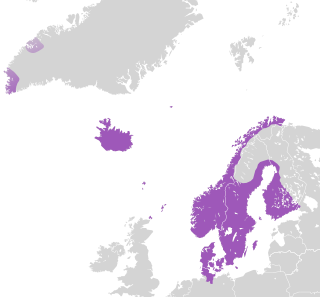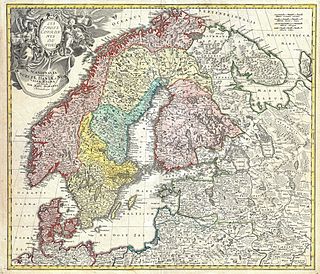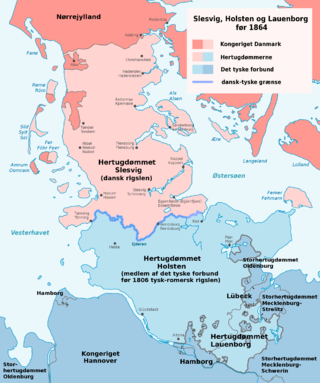The politics of the Faroe Islands, an autonomous country of the Kingdom of Denmark, function within the framework of a parliamentary, representative democratic dependency, whereby the Prime Minister of the Faroe Islands is the head of government, and of a multi-party system. The Faroe Islands are politically associated with the Kingdom of Denmark but have been self-governing since 1948. Executive power is exercised by the government. Legislative power is vested in both the government and the Løgting. The judiciary is independent of the executive and the legislature and the responsibility of Denmark.

Greenland is a North American island autonomous territory of the Kingdom of Denmark. It is the larger of two autonomous territories within the Kingdom, the other being the Faroe Islands; the citizens of both territories are full citizens of Denmark. As Greenland is one of the Overseas Countries and Territories of the European Union, citizens of Greenland are European Union citizens. The capital and largest city of Greenland is Nuuk. Greenland lies between the Arctic and Atlantic oceans, east of the Canadian Arctic Archipelago. It is the world's largest island, and is the location of the northernmost point of land in the world – Kaffeklubben Island off the northern coast is the world's northernmost undisputed point of land, and Cape Morris Jesup on the mainland was thought to be so until the 1960s.

The Kalmar Union was a personal union in Scandinavia, agreed at Kalmar in Sweden as designed by Queen Margaret of Denmark. From 1397 to 1523, it joined under a single monarch the three kingdoms of Denmark, Sweden, and Norway, together with Norway's overseas colonies.

Knud Johan Victor Rasmussen was a Greenlandic-Danish polar explorer and anthropologist. He has been called the "father of Eskimology" and was the first European to cross the Northwest Passage via dog sled. He remains well known in Greenland, Denmark and among Canadian Inuit.

Scandinavia is a subregion of Northern Europe, with strong historical, cultural, and linguistic ties between its constituent peoples. Scandinavia most commonly refers to Denmark, Norway, and Sweden. It can sometimes also refer to the Scandinavian Peninsula. In English usage, Scandinavia is sometimes used as a synonym for Nordic countries. Iceland and the Faroe Islands are sometimes included in Scandinavia for their ethnolinguistic relations with Sweden, Norway and Denmark. While Finland differs from other Nordic countries in this respect, some authors call it Scandinavian due to its economic and cultural similarities.

The Danish West Indies or Danish Virgin Islands or Danish Antilles were a Danish colony in the Caribbean, consisting of the islands of Saint Thomas with 32 square miles (83 km2); Saint John with 19 square miles (49 km2); and Saint Croix with 84 square miles (220 km2). The islands have belonged to the United States as the Virgin Islands since they were purchased in 1917. Water Island was part of the Danish West Indies until 1905, when the Danish state sold it to the East Asiatic Company, a private shipping company.

The history of Denmark as a unified kingdom began in the 8th century, but historic documents describe the geographic area and the people living there—the Danes—as early as 500 AD. These early documents include the writings of Jordanes and Procopius. With the Christianization of the Danes c. 960 AD, it is clear that there existed a kingship. King Frederik X can trace his lineage back to the Viking kings Gorm the Old and Harald Bluetooth from this time, thus making the Monarchy of Denmark the oldest in Europe. The area now known as Denmark has a rich prehistory, having been populated by several prehistoric cultures and people for about 12,000 years, since the end of the last ice age.

A geographer is a physical scientist, social scientist or humanist whose area of study is geography, the study of Earth's natural environment and human society, including how society and nature interacts. The Greek prefix "geo" means "earth" and the Greek suffix, "graphy", meaning "description", so a geographer is someone who studies the earth. The word "geography" is a Middle French word that is believed to have been first used in 1540.

Denmark is a Nordic country in the south-central portion of Northern Europe with a population of nearly 6 million; 767,000 live in Copenhagen. It is the metropolitan part, and most populous constituent part of, the Kingdom of Denmark, a constitutionally unitary state that includes the autonomous territories of the Faroe Islands and Greenland in the North Atlantic Ocean. Metropolitan Denmark is the southernmost of the Scandinavian countries, lying south-west and south of Sweden, south of Norway, and north of Germany, with which it shares a short border.

The northern region of Europe has several definitions. A restrictive definition may describe northern Europe as being roughly north of the southern coast of the Baltic Sea, which is about 54°N, or may be based on other geographical factors such as climate and ecology.

Aalborg University (AAU) is an international public university with campuses in Aalborg, Esbjerg, and Copenhagen, Denmark. Founded in 1974, the university awards bachelor's degrees, master's degrees, and PhD degrees in a wide variety of subjects within humanities, social sciences, information technology, design, engineering, exact sciences, and medicine.

Serampore College is located in Serampore, in West Bengal, India. Established in 1818, it is the fourth oldest college in the country after Old Seminary, Kottayam, CMS College, Kottayam and Presidency College Calcutta, and one of the oldest continuously operating educational institutes in India. The college consists of two entities: The theological faculty and a separate college with faculties of arts, science, commerce.

Femø is a Danish island north of Lolland. The island covers an area of 11.38 km2. Femø had 147 inhabitants in 2009, and 112 inhabitants 2023.

The West Indies is a subregion of North America, surrounded by the North Atlantic Ocean and the Caribbean Sea, which comprises 13 independent island countries and 19 dependencies in three archipelagos: the Greater Antilles, the Lesser Antilles, and the Lucayan Archipelago.
The Royal Danish Geographical Society is a scientific society.. The society aims to furthethe knowledge of the Earth and its inhabitants and to disseminate interest in the science of geography.

Geography is the study of the lands, features, inhabitants, and phenomena of Earth. Geography is an all-encompassing discipline that seeks an understanding of Earth and its human and natural complexities—not merely where objects are, but also how they have changed and come to be. While geography is specific to Earth, many concepts can be applied more broadly to other celestial bodies in the field of planetary science. Geography has been called "a bridge between natural science and social science disciplines."

Jutland is a peninsula of Northern Europe that forms the continental portion of Denmark and part of northern Germany (Schleswig-Holstein). It stretches from the Grenen spit in the north to the confluence of the Elbe and the Sude in the southeast. The historic southern border river of Jutland as a cultural-geographical region, which historically also included Southern Schleswig, is the Eider. The peninsula, on the other hand, also comprises areas south of the Eider: Holstein, the former duchy of Lauenburg, and most of Hamburg and Lübeck.
The Denmark Series is the fifth tier in the Danish football league system. Teams are divided into four groups of ten. The top team in each following promotion group is promoted to the Danish 3rd Division. The bottom three teams in each group are relegated to the regional Copenhagen Series, Zealand Series, Lolland-Falster Series, Funen Series, or Jutland Series as is appropriate for each club geographically.
Fennia is a biannual peer-reviewed open access scientific journal published by the Geographical Society of Finland. It covers all aspects of geography. The journal was established in 1889. The editor-in-chief is Kirsi Pauliina Kallio. The journal is abstracted and indexed in Scopus. and the Emerging Sources Citation Index.













